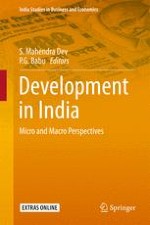2016 | OriginalPaper | Buchkapitel
8. Incremental Reforms in Food Policy: What Are the Possibilities?
verfasst von : Bharat Ramaswami, Milind Murugkar
Erschienen in: Development in India
Verlag: Springer India
Aktivieren Sie unsere intelligente Suche, um passende Fachinhalte oder Patente zu finden.
Wählen Sie Textabschnitte aus um mit Künstlicher Intelligenz passenden Patente zu finden. powered by
Markieren Sie Textabschnitte, um KI-gestützt weitere passende Inhalte zu finden. powered by
